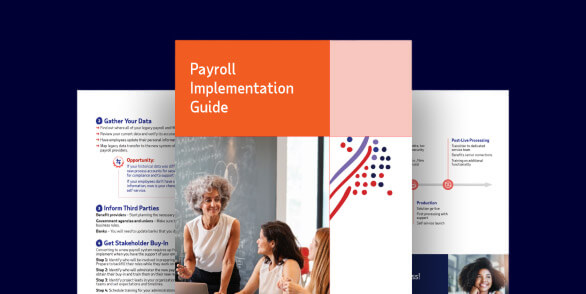insight
Small business payroll systems
Ready for a payroll solution that does the heavy lifting for you?
Most small business owners are experts in the products or services that they provide, not paying employees or filing taxes. To learn these skills effectively would only take precious time and resources away from activities that drive profits and growth. Alternatively, employers can use a small business payroll system, which may allow them to focus their efforts on running a successful operation, while still ensuring that all of their payroll needs are handled properly.
Table of Contents
What is a small business payroll system?
A small business payroll system is software that gives employers a simpler way to manage payroll in-house without having to hire a payroll manager or spend long hours crunching numbers. Most solutions are capable of calculating wages and deductions, as well as helping support compliance and reporting requirements.
Why use a small business payroll system?
Federal, state and local regulations that govern employment and payroll are constantly changing. Employers who don’t have the expertise or the bandwidth to keep up with these rules may want to consider using a small business payroll system. In so doing, they can help avoid the costly penalties that often result from payroll compliance violations.
Other reasons for using a small business payroll system include:
-
Productivity
Payroll software automates the most time-consuming aspects of payroll, like calculations and payments, so that small business owners who are already wearing multiple hats can get the most out of every busy day. -
Security
The last thing any organization wants in its infancy is a data breach, which is why most small business payroll systems have cutting-edge security to protect sensitive employee information. -
Minimized errors
In addition to saving time, automation has the added benefit of preventing miscalculations – one of the most common and costly mistakes that employers make when they try to do payroll on their own. -
Employee self-service
When employees can access their pay information and manage their withholdings, it frees up managers and owners from fielding administrative requests.

See how easy small business payroll can be
Pay your people in just minutes with our intuitive platform.
Features of small business payroll systems
Small business payroll systems can turn basic administrative functions into value-added employee experiences. Some of the features that make this possible include:
-
Wage and tax calculations
Automated payroll processing takes care of the calculations for wages, taxes and other deductions with minimal effort from employers. -
Flexible payment options
The ability to pay employees their way – whether it’s paycheck, direct deposit or paycard – can improve engagement and attract new talent. -
Tax filing services
With full-service payroll, a business’s tax payments and quarterly and annual returns may be filed on its behalf by the provider. -
Seamless integrations
Integrating payroll with timekeeping, benefits and other HR programs eliminates duplicate data entry and the errors that often result from it. -
Reporting and analysis
Most payroll software comes with comprehensive reporting across all aspects of payroll, including wages paid, taxes deducted, hours worked and more. -
Compliance assistance
Employers typically have easy access to mandatory tax forms, such as Forms W-2 and W-9, and in some cases, will be notified of changes to wage and tax laws. -
Product support
Depending on the provider, certified payroll professionals may be available 24/7 to answer customer questions and troubleshoot problems. -
Mobile accessibility
Payroll that’s mobile friendly allows employers to pay employees and check tax payments anywhere, any time.

More than 900,000 small business customers choose ADP for payroll.
We make payroll easier than ever.
How to choose a payroll system for your small business
Choosing a small business payroll system often comes down to striking the right balance between control and automation. Here’s how to guide the evaluation process:
- Identify current pain points or limitations
- Explore how a payroll provider can solve those problems
- Ask whether assistance with local taxes is included
- Find out how much time it will take to run payroll
- Ask about estimated cost
- Determine whether the product will integrate with existing payroll processes
- Find out when the transition can begin
- Discover what support services are provided post-implementation
Let’s take a closer look at how to choose a small business payroll system:
1. What are the current pain points or limitations?
Identify the aspects of payroll that represent the biggest challenges – calculations, compliance, timekeeping, etc.
2. How can a payroll provider solve those problems?
In addition to payroll basics, determine which features, such as recruitment and benefits administration, might be needed down the road.
3. Is assistance with local taxes included?
Local taxes can vary greatly from one municipality to the next and change with little notice. Unfortunately, not all payroll providers are able to assist with this challenge.
4. How much time will it take to run payroll?
Employers who are running payroll manually should expect to significantly reduce the amount of time they’re devoting to the process, but how much ultimately depends on the level of service they choose.
5. What is the estimated cost?
Payroll costs typically vary based on payroll frequency, total number of employees and the services required.
6. Will the product integrate with existing payroll processes?
Payroll software that automatically syncs with popular accounting programs, like QuickBooks™, ensures a seamless transfer of payroll data.
7. When can the transition start?
Some payroll providers will onboard new clients only at the start of a new quarter or new year, while others can accommodate a move at any time.
8. What support services are provided post-implementation?
Determine who will be responsible for quality assurance testing, compliance-related updates and data security.
Why choose ADP small business payroll systems?
ADP provides small business payroll systems that are fast, easy to use and backed by expert support. In fact, three out of four customers spend 15 minutes or less running payroll with us.3
That distinction is reinforced by G2’s Winter 2026 Grid Report, where verified users ranked ADP as the number one provider of small-business payroll. The software received top marks for quality of support, ease of use and ease of administration.4
Here’s what small business owners can expect when using our payroll service:
- Wages and tax deductions calculated automatically
- Intelligent tech that flags potential errors
- Regulatory compliance support
- Seamless integrations with time and attendance
- Mobile capabilities for payroll processing on the go
- Quarterly and annual tax reporting
- Employee self-service
And as they grow, employers can add on other services, such as:
- HR support
- Wage garnishment payment services
- Job postings through ZipRecruiter®
- Integrated health insurance and retirement plans
Frequently asked questions about small business payroll systems
What is the best type of payroll system for a small business?
The best type of payroll for small businesses is one that alleviates the administrative burden of paying employees and filing taxes so that owners can focus on growing their profit margins. Services that include regulatory monitoring and compliance assistance provide an added level of assurance.
Can I do payroll myself?
Do-it-yourself payroll may be tempting to employers who have basic accounting skills and only a handful of employees. However, the requirements of the job can quickly become overwhelming, and if mistakes are made, the ensuing tax penalties might cost more than the fee of a payroll provider.
Is ADP good for small business payroll?
ADP is ideal for small businesses because we offer affordable payroll options with plenty of flexibility to accommodate growth. Employers can sign up for only the services they need today and easily add additional features, like timekeeping and benefits, whenever they’re ready.
According to the G2 Winter 2026 Grid report, ADP is also recognized as a leader in small business payroll, reinforcing our commitment to delivering trusted, high-quality solutions.4
Want more exclusive business insights like this delivered to your inbox?Subscribe now
This guide is intended to be used as a starting point in analyzing how to do a payroll and is not a comprehensive resource of requirements. It offers practical information concerning the subject matter and is provided with the understanding that ADP is not rendering legal or tax guidance or other professional services. Please consult with your legal counsel.
- ZipRecruiter is a registered trademark of ZipRecruiter, Inc.
- Legal services are provided by Upnetic Legal Services, a third-party provider
- Internal survey of 752 RUN Powered by ADP customers in 2020
- ADP G2 user review data from November 2025





